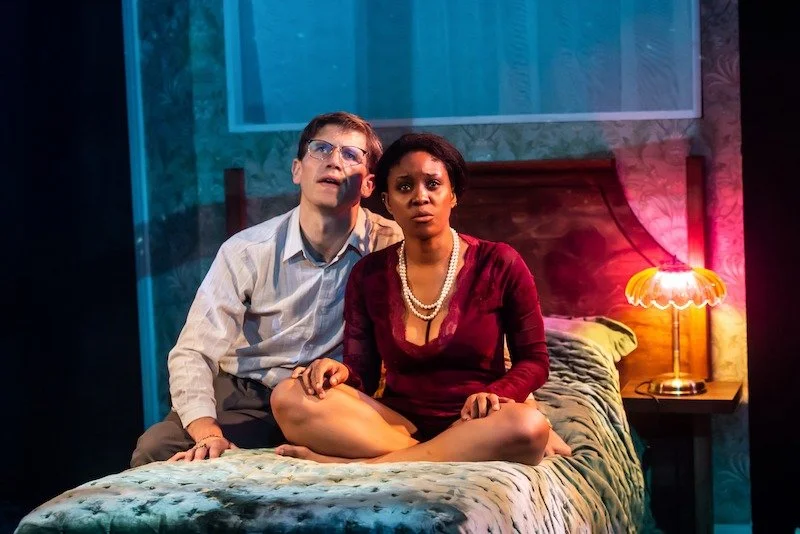ECHO at King’s Head Theatre Review
Kyle Rowe & Amara Okereke in ECHO. Photo by Lidia Crisafulli
Written by Paris for Theatre & Tonic
Disclaimer: Gifted tickets in exchange for an honest review
When I read the premise of Echo, I wasn’t sure what to expect. The teaser was eerie, intimate, compelling, yet vague. About halfway through the show, I found myself genuinely excited. The story was clearly moving toward thematically rich territory: ethical grey zones, Freudian dilemmas, and questions around identity, obsession, fertility, and a strange longing for death. I hadn’t anticipated the sheer emotional and philosophical weight the play would attempt to carry, and it made me hopeful for a bold, uncomfortable exploration. Unfortunately, despite the promise in its premise and structure, the production ultimately falls short. It is unable to fully realise its most provocative ideas.
Written by Susan Eve Haar and directed by Abigail Zealey Bess, the play unfolds across two timelines. In the past, we see a couple celebrating their anniversary in a kitschy Airbnb. What begins as playful, erotic games quickly shifts into something darker and surreal, culminating in the arrival of a surprising gift and an even more unexpected child. In the present, a woman and her much older partner return to the same room to scatter her mother’s ashes. Gradually, it becomes clear that she is more than just her mother’s daughter. She is something far stranger: a mirrored version, a genetic echo. As the story develops, questions arise about where identity ends and inheritance begins, and how time, desire, and memory blur together.
Amara Okereke brings energy and emotional complexity to the role of “She,” often giving the impression that we are glimpsing something intensely private. Kyle Rowe, as “He,” balances her intensity with his honest confusion. Both performers are compelling in their individual moments. However, the chemistry between them is never fully convincing, partly due to the staging and partly due to the structure of the text. Their scenes together feel overly controlled, making it difficult for the emotional dynamics to breathe. This is a missed opportunity, especially given the material’s potential for intimacy and spontaneity. Bess’s direction feels too rigid at times and keeps the performers confined within beats that might have benefited from more freedom and risk.
Visually, the production is a success. Peiyao Wang’s set transforms the small stage into a B&B that is at once strange, cheap, oddly charming, and familiar. The claustrophobic yet cosy aesthetic feels real, and it suits the play’s central themes of memory and repetition. Daniel Carter-Brennan’s lighting complements this well, shifting from warmth to unease as the story evolves.
The writing, however, is where the production struggles most. The play touches on fascinating themes such as infertility, legacy, and the psychological burden of maternal longing, but fails to explore them in any meaningful depth. At one point, a powerful question arises: is Her desire to die linked to her inability to conceive? It is a compelling idea, but it’s introduced only to be dropped without real exploration. The twist involving the child, revealed to be a genetic replica of “She,” could have unlocked countless narrative possibilities. It raises deeply Freudian and existential questions, especially as the child later enters a romantic relationship with the older man who once loved her mother. But the play sidesteps those complexities and moves forward without giving them the weight they deserve.
Stranger still, the characters react to these surreal developments with unnatural calm. Life- altering discoveries are met with oddly measured responses, leaving the audience emotionally detached. The second half of the play, which could have dug into identity and free will, instead drifts into an ending that feels half-hearted and uncertain. The writing seems unsure of what it wants to say, avoiding its most daring impulses in favour of a soft, ambiguous resolution.
In the end, Echo aspires to something bold, and that in itself is respectable. There is genuine intrigue in its concept, and some audience members may find the questions it raises compelling enough to justify a visit. The performances are strong, and the visual design is memorable. But those hoping for a profound exploration of the human psyche may leave disappointed. Echo opens the door to a haunting psychological landscape but never fully dares to step inside.
At King’s Head Theatre until 17 August 2025
★★★













![Antigone [on strike], Park Theatre Review](https://images.squarespace-cdn.com/content/v1/63734f8309e2800b55c9fc71/1738742813298-BK3ZXKD43ZOSXV4GI54R/Antigone+%5Bon+strike%5D+photo+by+Nir+Segal+A.jpg)



